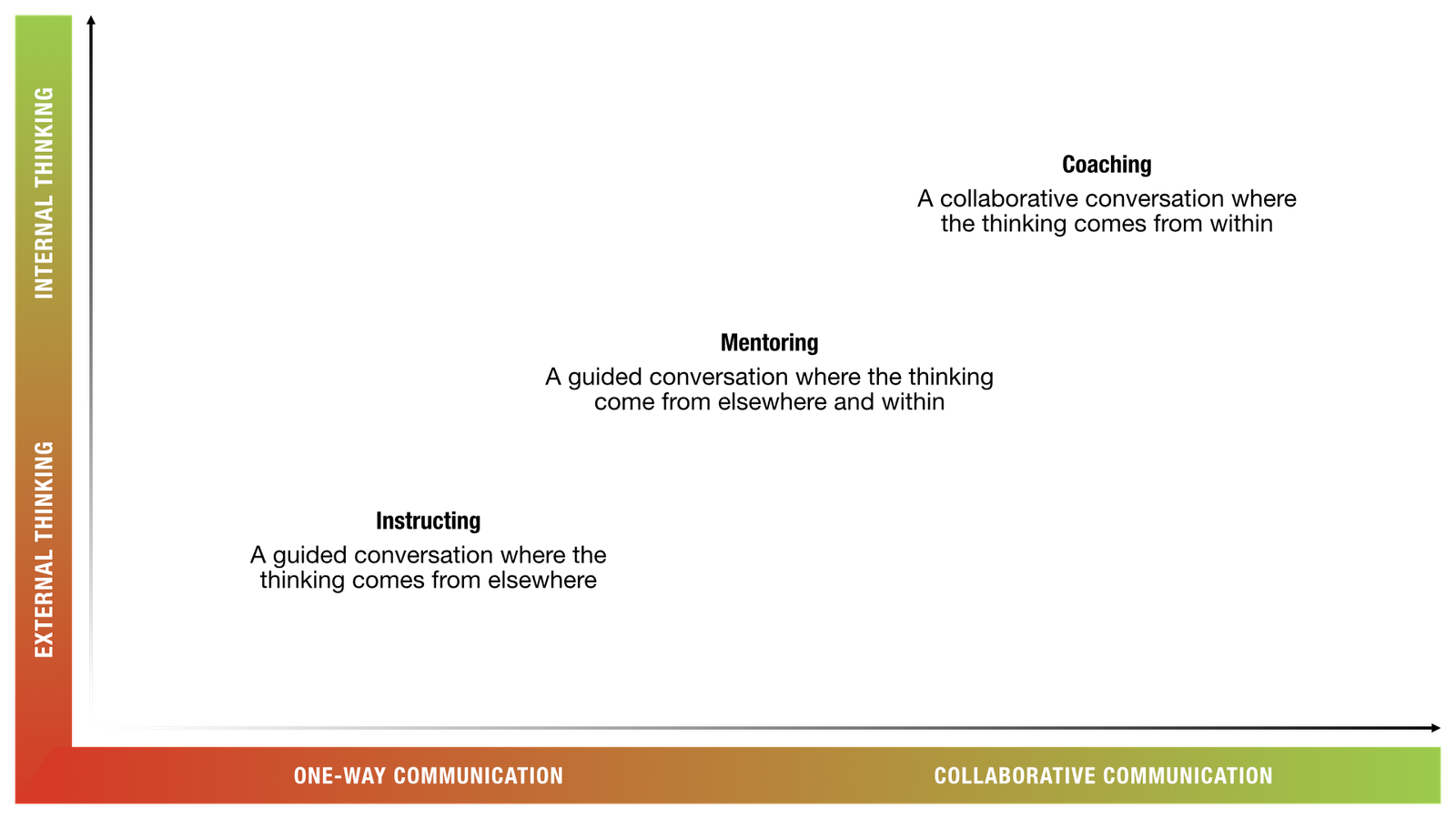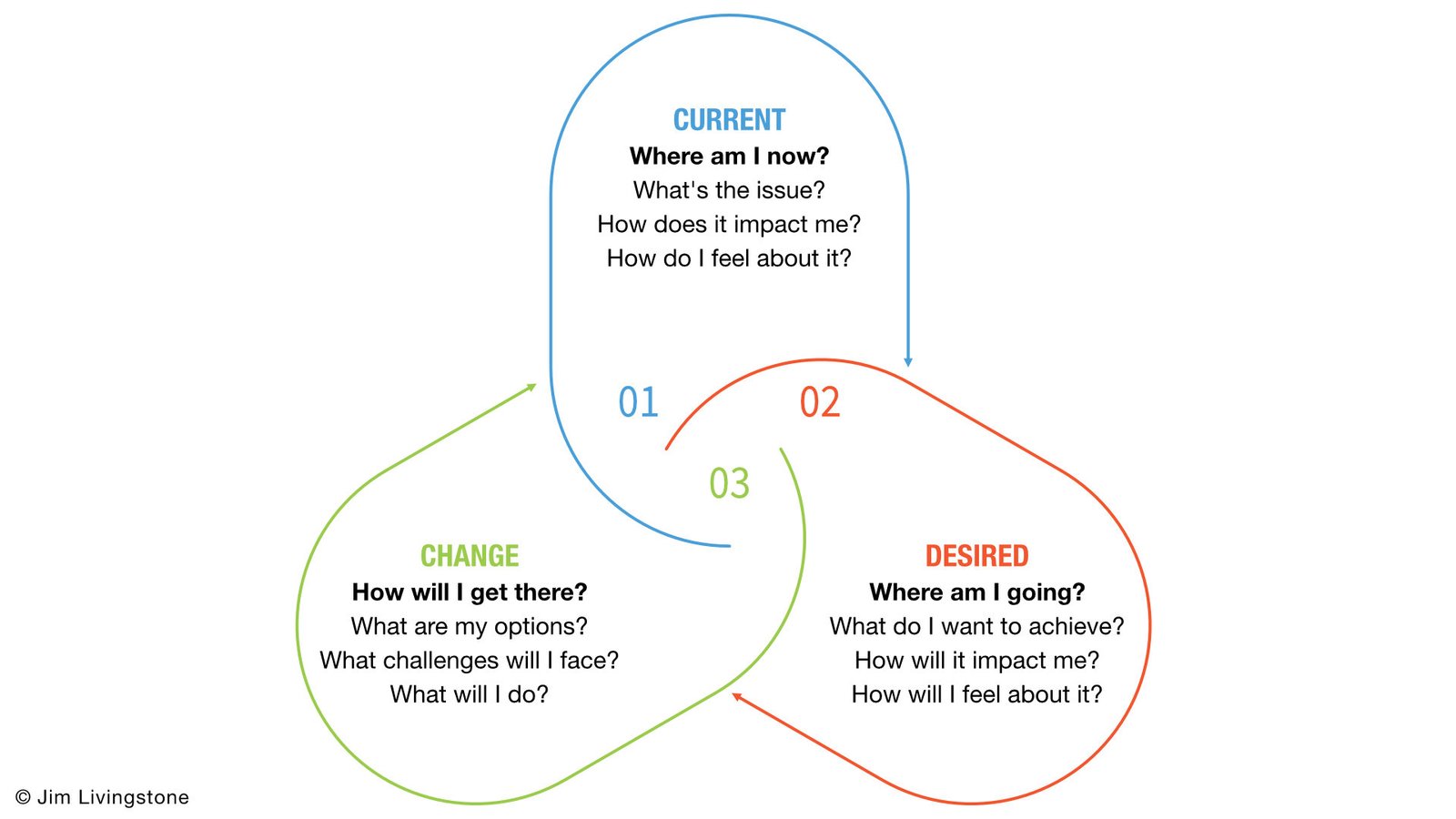Instructing, mentoring and coaching are three important skills that every leader should possess, as there will be times that they are called upon to provide instructions, mentor or coach someone.
Sadly, many leaders and organisations alike, do not actually know the difference between them and when they should be used. In this article I'm going to attempt to remove any uncertainty around the topic.
What's the Difference?
The best way to explain how Instructing, Mentoring and Coaching are different is to plot them on a vertical and horizontal axis.

The vertical axis represents the extent to which the thinking is controlled by an external or internal source. When all the ideas, thoughts and solutions come from an external source it leaves little room for thinking.
The horizontal axis represents the extent to which it is a one-way or collaborative conversation. One-way conversations tend to leave little room for thinking whereas collaboration enhances thinking.
What is Instructing and when should it be used?
Instructing is the process of transferring specific instructions. It sits in the bottom left hand corner of the matrix because it is a one-way communication and provides all the thinking for the receiver. It is reliant on the instructor's ability to provide clear and concise direction or instructions.
Instructing should be used when the recipient is incapable of completing a task or achieving an objective within a given timeframe without specific instructions. Some examples of this might include:
- When an individual requires clarity around their roles and responsibilities.
- When an individual is assigned a task that they have never done before.
- When time is of the essence.
Be careful. The risk of giving instructions is that the individual may become prone to expecting instructions all the time.
What is Mentoring and when should it be used?
Mentoring is the process of providing guidance and advice. It sits in the middle of the matrix because it requires a combination of one-way and collaborative conversation as well as providing some of the thinking.
Mentoring is reliant on the mentor's ability to share an experience, tell a story or provide guidance followed by asking coaching styled questions.
Mentoring should be used when the sharing experience and expertise is required. Some examples of this might include:
- To support the on-boarding of new employees.
- To support individuals as they transition into different roles.
- To provide a little inspiration when its needed.
The relationship between a mentor and mentee is founded on the basis that the mentor is there to give advice or share experiences.
Be Careful. By providing advice or sharing experiences you may inadvertently bias the thought process of the mentee. It's really important that you follow it up with thoughtful questions that challenge there thinking!
What is Coaching and when should it be used?
The history of coaching can be traced back Socrates, and the Socratic method; the practice of asking questions to promote inquiry and learning. Coaching is the process of raising awareness and unlocking potential through collaborative discussion.

Coaching is reliant on the coach's ability to take the coachee through a process of self discovery and build commitment towards an actionable outcome by listening to everything that is said and unsaid and asking thought provoking questions.
Coaching should be used when you want to enable and empower people to be self-sufficient. Some examples of this might include:
- To develop the capabilities or correct behaviours of an individual or individuals.
- To help an individual or individuals to become self-sufficient (teach them to fish).
- To build commitment and ownership from an individual or individuals towards a set of actions.
- To help an individual or individuals to think their way through an issue.
The relationship between a coach and coachee is founded on the basis that the coach is there to help the coachee to think their way through their issues, not give them the answers.
Here's a very simple example of how Instructing, Mentoring and Coaching might be applied to an individual who is struggling to manager their time.
- Instructing: Ok. For the next 5 days I want you to classify every task according to whether they are Important & Urgent, Important & Not Urgent, Urgent & Not Important and Not Urgent & Not Important. Everything that is Urgent & Important gets done first etc.
- Mentoring: I use to have a similar problem when I was your age, but I found a solution in classifying every task according to whether they are Important & Urgent, Important & Not Urgent, Urgent & Not Important and Not Urgent & Not Important. I found this structure very helpful for me. What structure would you find helpful?
- Coaching: Why do you think you are having a problem with time management? What would managing your time better look like? How would you feel if you were able to manage your time better? What can you do to manage your time better?
In Conclusion
Instructing, mentoring and coaching all have a role to play... But the reason why coaching is so powerful is explained in the iceberg image at the top of this article, as many of the blockers that people face in life occur below the surface and requires inquiry and self-reflection to help unblock.


